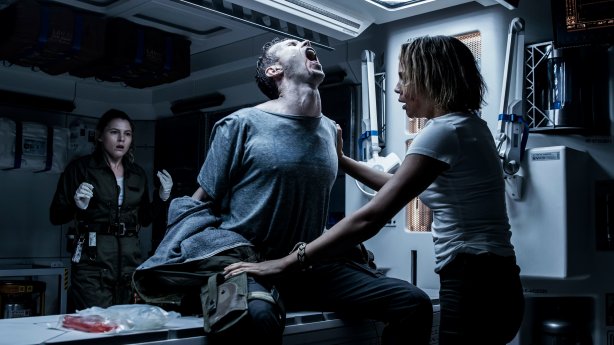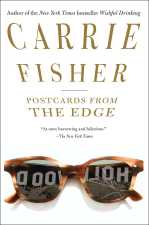Directed by Martin McDonagh. Starring Frances McDormand, Woody Harrelson and Sam Rockwell.

Just when would the costume designer pay for their crimes against fashion?
Mildred Hayes (McDormand) is angry. It’s been seven months since her daughter was raped and murdered, and the police in Ebbing seem no closer to finding out who killed her. Consumed by rage and grief Mildred rents three abandoned billboards and uses them to very pointedly ask why the police haven’t solved the case.
The appearance of the billboards upsets the local sheriff, Bill Willoughby (Harrelson) who feels Mildred’s ire is unfair. He feels there’s a limit to what the police can do when there’s no evidence and no witnesses. Though he tries to assure Mildred that they haven’t given up on the case she is not to be dissuaded and has no intention of bringing the billboards down.
The locals are sympathetic to Mildred’s loss, but they’re more sympathetic to their sheriff, and as time passes the locals become more and more angry at Mildred, none more so than Officer Jason Dixon (Rockwell) an angry, racist cop who idolises Sheriff Willoughby.
As tragedy strikes Mildred finds an increasing array of obstacles in her path; is there any hope of getting justice for her daughter?
It’s hard to believe that Three Billboards (yeah I’m not gonna type the whole title each time, so sue me) is only the third full length film written and directed by McDonagh in almost ten years. He burst onto the scene with In Bruges in 2008, a wonderfully spiky gangster film that established him as a man who could make even the coarsest curses sound almost poetic and who could marry humour and extreme violence seamlessly. He followed In Bruges up four years later with Seven Psychopaths. Whilst not up to the standard of In Bruges, Seven Psychopaths was an enjoyable film that followed a similar path to McDonagh’s first work; it was spiky, foul mothed, violenct and a lot of fun.
Now three years later we have Three Billboards. In many respects it follows the pattern of the first two films, it’s a film that bristles, it deals with a cast of engaging characters, it’s a drama that revolves around a violent crime and, of course, it’s incredibly funny and foul mouthed. In all other respects however, Three Billboards is very different, this is a more grown up affair.
It’s a difficult film to pigeonhole. Yes it’s a very black comedy, but beyond this it’s a tale of grief and the extremes it will push people too, and it’s a story about how nobody is all good, nobody all bad, and how some people can surprise you.
McDonagh’s script is excellent, every word seeming chosen with meticulous care, and his overarching message that violence begets violence is never far away. In his casting he has actors each of whom is able to take those words and do something wonderful with them, and it’s in the dialogue and acting that the film primarily succeeds.
McDormand is a great actor, and she will forever be Marge Gunderson in Fargo. Mildred is about as far away from Marge as you can get, where Marge was innocent, Mildred is anything but, and McDormand wrings every drop of emotion from the role, swaggering around town like a female John Wayne (a metaphor ably supported by her own twangy Western theme) she’s angry, grief-stricken, tough as nails and yet also incredibly fragile. I don’t think there are many actors who could have pulled this off without either making Mildred too sympathetic, or making her too unlikable, and however much we might be rooting for Mildred, the film never shies away from the fact that she’s going too far. I won’t be at all surprised if McDormand ends up with another Gold statue in a few weeks’ time.
Harrelson imbues Willoughby with a huge amount of humanity, and in many respects he’s the most sympathetic character in the film—though special mention must be made of Peter Dinklage who excels in a cameo role as the local car salesman with something of a crush on Mildred—and Harrelson’s performance helps the film enormously, he’s so darn nice that it makes Mildred seem all the more extreme.

“I’m telling you, sheriff, she’s that pregnant cop from up north!”
Rounding out the main case is Rockwell, who I’ve been a fan of since Galaxy Quest. He has great comic timing, but also essays Dixon’s anger management issues to a tee, and it says something about Rockwell as an actor that he can make Dixon sympathetic.
You can probably tell I enjoyed this film, but that said I don’t think it’s quite as fantastic as a lot of critics would have you believe. There are plot contrivances that are a little too convenient, one of which relates to the Ebbing police station’s opening hours, and whilst many have singled out the reading of some letters as a masterful scene, I’m not so sure. They seemed a little too eloquent, and though the character’s voice is heard I couldn’t shake the feeling that I was really hearing McDonagh. There’s also the small matter of one character’s evolution, they’re overplayed as an idiot to begin with, which makes where they eventually end up stretch credulity a little, although the actor’s so good they manage to pull it off. I also found the eclectic soundtrack jarring, skipping from Spaghetti western to classical, to showtunes and pop; who knows, perhaps that was supposed to be jarring?

You shouldn’t need a magnifying class to see what’s great about this film.
Overall the strengths outweigh the weaknesses, though it won’t be a film for everyone. The language is beyond fruity, and the lack of a neat resolution will infuriate some. Me, I loved the cursing, and as for the moral ambiguity, that was another one of the strengths of the film, and for me the final scene as one of the most note perfect endings I’ve seen, for some reason evoking the end of John Carpenter’s The Thing (from the perspective of a weary “Let’s see what happens” kind of way, I’m not suggesting anyone in this is an alien shapeshifter!)
Sharp, funny, heartrending and incredibly foul mouthed, it’s not perfect by any means but I will certainly be paying another visit to Ebbing soon.






 By Carrie Fisher
By Carrie Fisher